Arguments For and Against Corporate Social Responsibility Essay
VerifiedAdded on 2020/04/01
|9
|2078
|88
Essay
AI Summary
This essay delves into the concept of Corporate Social Responsibility (CSR), examining its multifaceted nature and significance in the business world. It begins by defining CSR as activities undertaken by companies to improve the social welfare of employees, the community, and the environment, extending beyond legal requirements. The essay then explores the arguments for CSR, primarily based on stakeholder theory, which emphasizes the importance of considering the interests of various stakeholders, including shareholders, employees, customers, and suppliers. Real-world examples, such as Starbucks' CSR initiatives, are provided to illustrate the practical application of CSR. Conversely, the essay presents arguments against CSR, focusing on the fundamental goal of profit maximization, the challenges in quantifying CSR benefits, and the potential for transferring social costs. Examples like Volkswagen's case are used to support the arguments. The essay concludes by suggesting that the decision to engage in CSR necessitates consultations with all stakeholders involved, highlighting the complex nature of CSR in the current business landscape.
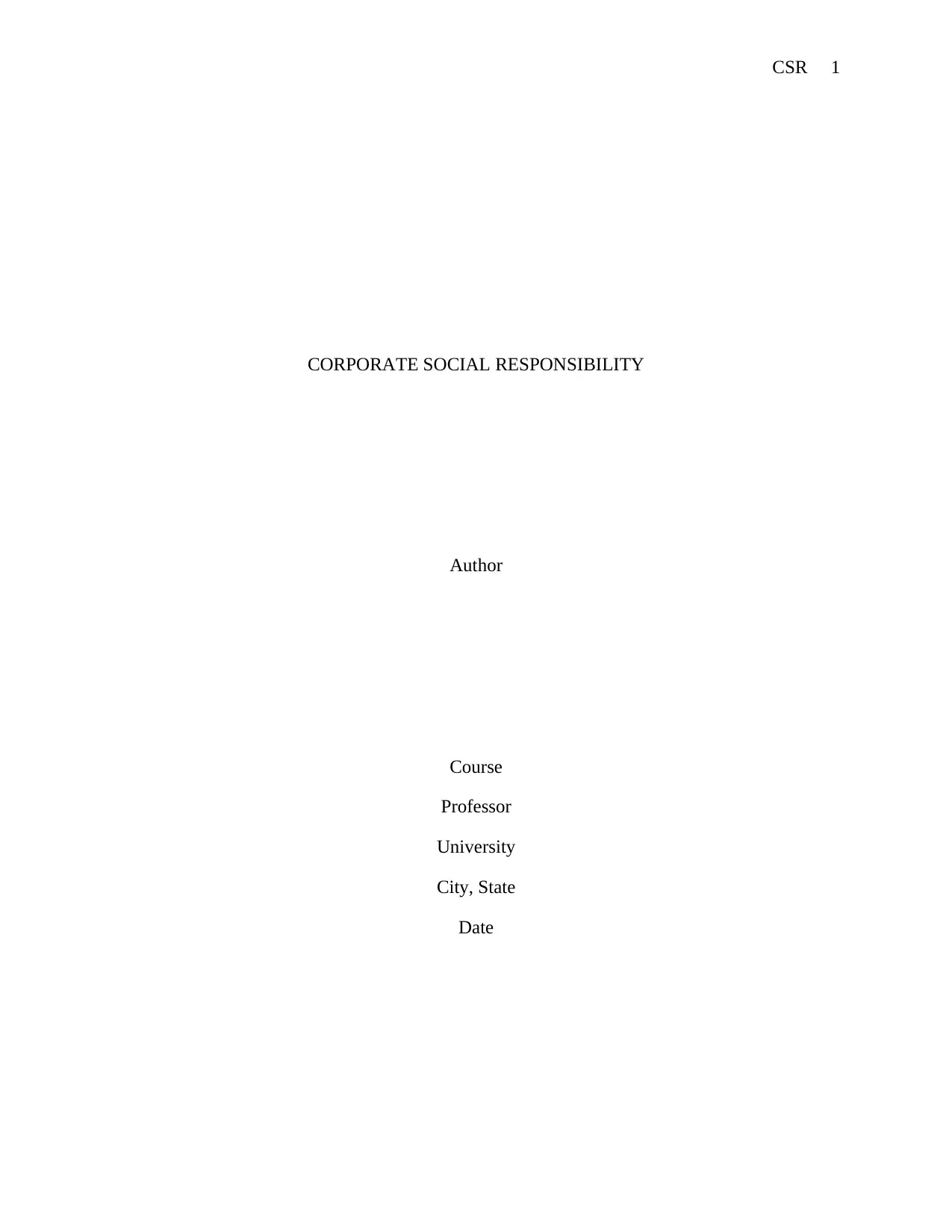
CSR 1
CORPORATE SOCIAL RESPONSIBILITY
Author
Course
Professor
University
City, State
Date
CORPORATE SOCIAL RESPONSIBILITY
Author
Course
Professor
University
City, State
Date
Paraphrase This Document
Need a fresh take? Get an instant paraphrase of this document with our AI Paraphraser
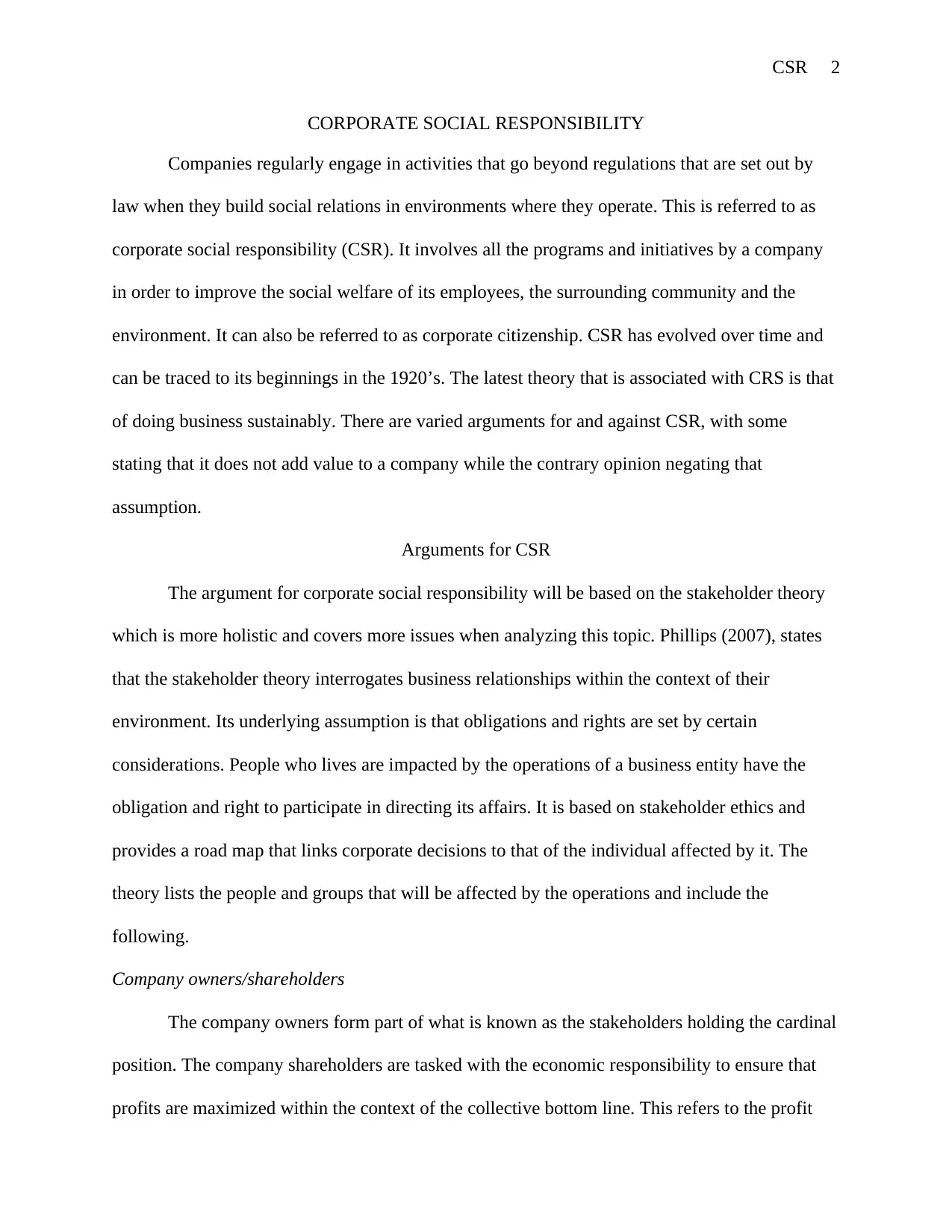
CSR 2
CORPORATE SOCIAL RESPONSIBILITY
Companies regularly engage in activities that go beyond regulations that are set out by
law when they build social relations in environments where they operate. This is referred to as
corporate social responsibility (CSR). It involves all the programs and initiatives by a company
in order to improve the social welfare of its employees, the surrounding community and the
environment. It can also be referred to as corporate citizenship. CSR has evolved over time and
can be traced to its beginnings in the 1920’s. The latest theory that is associated with CRS is that
of doing business sustainably. There are varied arguments for and against CSR, with some
stating that it does not add value to a company while the contrary opinion negating that
assumption.
Arguments for CSR
The argument for corporate social responsibility will be based on the stakeholder theory
which is more holistic and covers more issues when analyzing this topic. Phillips (2007), states
that the stakeholder theory interrogates business relationships within the context of their
environment. Its underlying assumption is that obligations and rights are set by certain
considerations. People who lives are impacted by the operations of a business entity have the
obligation and right to participate in directing its affairs. It is based on stakeholder ethics and
provides a road map that links corporate decisions to that of the individual affected by it. The
theory lists the people and groups that will be affected by the operations and include the
following.
Company owners/shareholders
The company owners form part of what is known as the stakeholders holding the cardinal
position. The company shareholders are tasked with the economic responsibility to ensure that
profits are maximized within the context of the collective bottom line. This refers to the profit
CORPORATE SOCIAL RESPONSIBILITY
Companies regularly engage in activities that go beyond regulations that are set out by
law when they build social relations in environments where they operate. This is referred to as
corporate social responsibility (CSR). It involves all the programs and initiatives by a company
in order to improve the social welfare of its employees, the surrounding community and the
environment. It can also be referred to as corporate citizenship. CSR has evolved over time and
can be traced to its beginnings in the 1920’s. The latest theory that is associated with CRS is that
of doing business sustainably. There are varied arguments for and against CSR, with some
stating that it does not add value to a company while the contrary opinion negating that
assumption.
Arguments for CSR
The argument for corporate social responsibility will be based on the stakeholder theory
which is more holistic and covers more issues when analyzing this topic. Phillips (2007), states
that the stakeholder theory interrogates business relationships within the context of their
environment. Its underlying assumption is that obligations and rights are set by certain
considerations. People who lives are impacted by the operations of a business entity have the
obligation and right to participate in directing its affairs. It is based on stakeholder ethics and
provides a road map that links corporate decisions to that of the individual affected by it. The
theory lists the people and groups that will be affected by the operations and include the
following.
Company owners/shareholders
The company owners form part of what is known as the stakeholders holding the cardinal
position. The company shareholders are tasked with the economic responsibility to ensure that
profits are maximized within the context of the collective bottom line. This refers to the profit
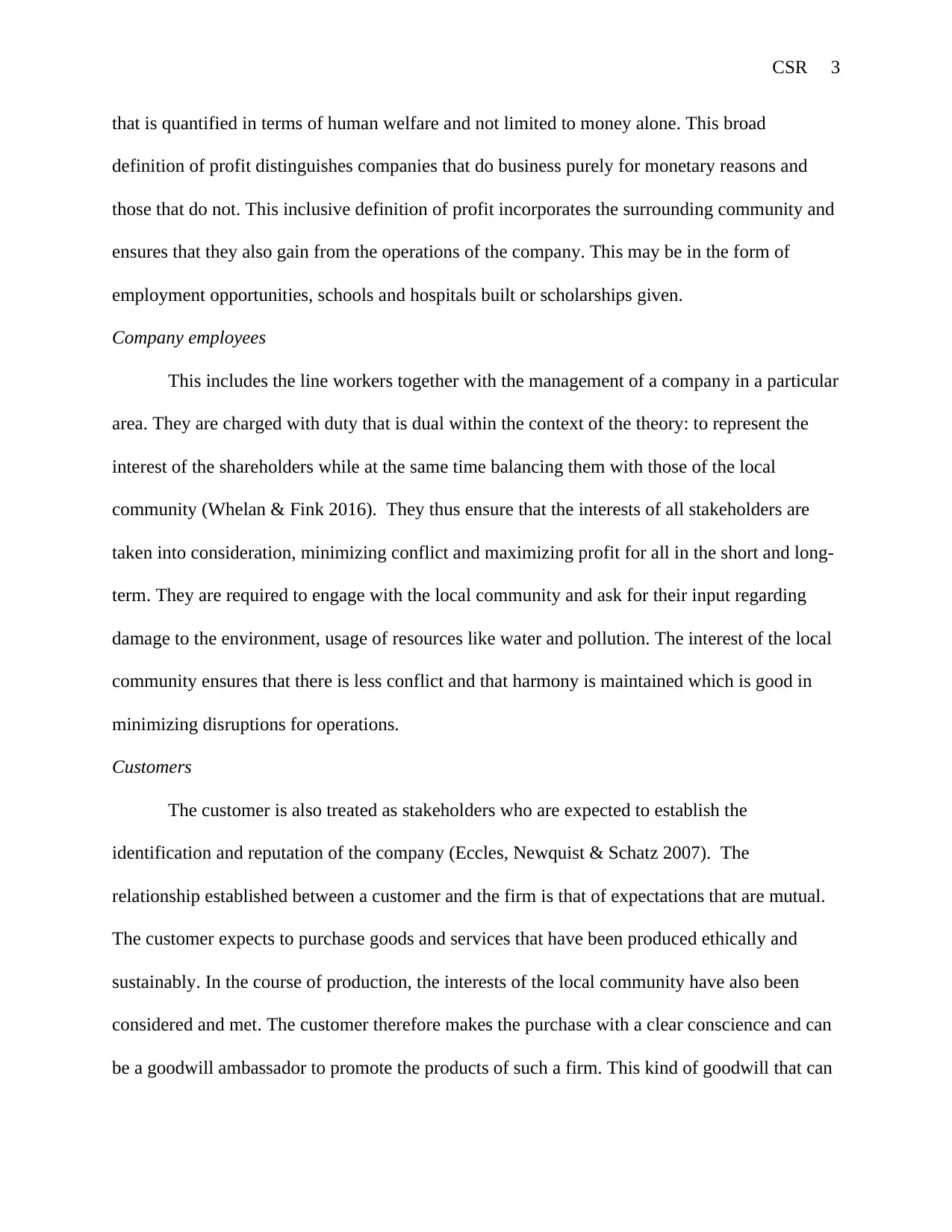
CSR 3
that is quantified in terms of human welfare and not limited to money alone. This broad
definition of profit distinguishes companies that do business purely for monetary reasons and
those that do not. This inclusive definition of profit incorporates the surrounding community and
ensures that they also gain from the operations of the company. This may be in the form of
employment opportunities, schools and hospitals built or scholarships given.
Company employees
This includes the line workers together with the management of a company in a particular
area. They are charged with duty that is dual within the context of the theory: to represent the
interest of the shareholders while at the same time balancing them with those of the local
community (Whelan & Fink 2016). They thus ensure that the interests of all stakeholders are
taken into consideration, minimizing conflict and maximizing profit for all in the short and long-
term. They are required to engage with the local community and ask for their input regarding
damage to the environment, usage of resources like water and pollution. The interest of the local
community ensures that there is less conflict and that harmony is maintained which is good in
minimizing disruptions for operations.
Customers
The customer is also treated as stakeholders who are expected to establish the
identification and reputation of the company (Eccles, Newquist & Schatz 2007). The
relationship established between a customer and the firm is that of expectations that are mutual.
The customer expects to purchase goods and services that have been produced ethically and
sustainably. In the course of production, the interests of the local community have also been
considered and met. The customer therefore makes the purchase with a clear conscience and can
be a goodwill ambassador to promote the products of such a firm. This kind of goodwill that can
that is quantified in terms of human welfare and not limited to money alone. This broad
definition of profit distinguishes companies that do business purely for monetary reasons and
those that do not. This inclusive definition of profit incorporates the surrounding community and
ensures that they also gain from the operations of the company. This may be in the form of
employment opportunities, schools and hospitals built or scholarships given.
Company employees
This includes the line workers together with the management of a company in a particular
area. They are charged with duty that is dual within the context of the theory: to represent the
interest of the shareholders while at the same time balancing them with those of the local
community (Whelan & Fink 2016). They thus ensure that the interests of all stakeholders are
taken into consideration, minimizing conflict and maximizing profit for all in the short and long-
term. They are required to engage with the local community and ask for their input regarding
damage to the environment, usage of resources like water and pollution. The interest of the local
community ensures that there is less conflict and that harmony is maintained which is good in
minimizing disruptions for operations.
Customers
The customer is also treated as stakeholders who are expected to establish the
identification and reputation of the company (Eccles, Newquist & Schatz 2007). The
relationship established between a customer and the firm is that of expectations that are mutual.
The customer expects to purchase goods and services that have been produced ethically and
sustainably. In the course of production, the interests of the local community have also been
considered and met. The customer therefore makes the purchase with a clear conscience and can
be a goodwill ambassador to promote the products of such a firm. This kind of goodwill that can
⊘ This is a preview!⊘
Do you want full access?
Subscribe today to unlock all pages.

Trusted by 1+ million students worldwide
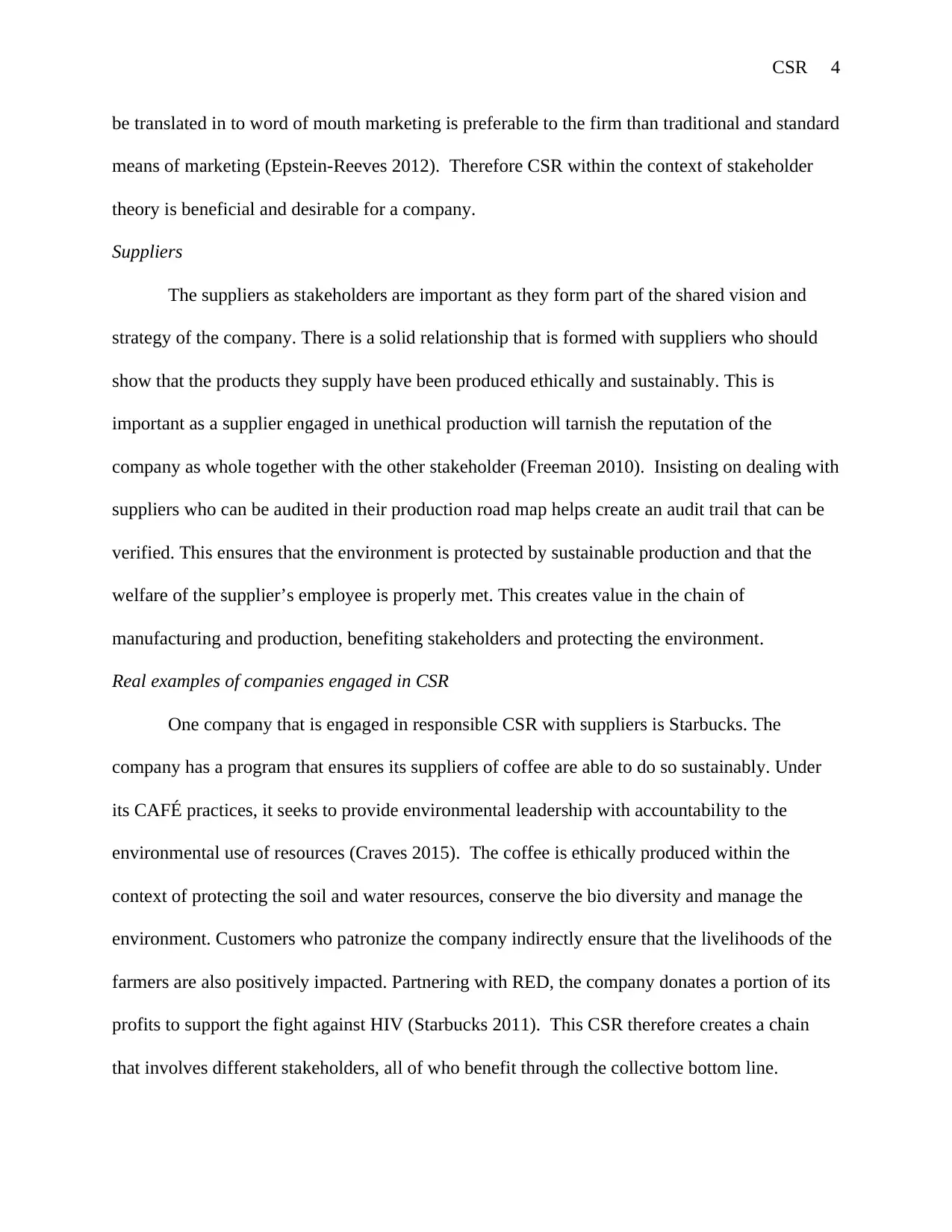
CSR 4
be translated in to word of mouth marketing is preferable to the firm than traditional and standard
means of marketing (Epstein-Reeves 2012). Therefore CSR within the context of stakeholder
theory is beneficial and desirable for a company.
Suppliers
The suppliers as stakeholders are important as they form part of the shared vision and
strategy of the company. There is a solid relationship that is formed with suppliers who should
show that the products they supply have been produced ethically and sustainably. This is
important as a supplier engaged in unethical production will tarnish the reputation of the
company as whole together with the other stakeholder (Freeman 2010). Insisting on dealing with
suppliers who can be audited in their production road map helps create an audit trail that can be
verified. This ensures that the environment is protected by sustainable production and that the
welfare of the supplier’s employee is properly met. This creates value in the chain of
manufacturing and production, benefiting stakeholders and protecting the environment.
Real examples of companies engaged in CSR
One company that is engaged in responsible CSR with suppliers is Starbucks. The
company has a program that ensures its suppliers of coffee are able to do so sustainably. Under
its CAFÉ practices, it seeks to provide environmental leadership with accountability to the
environmental use of resources (Craves 2015). The coffee is ethically produced within the
context of protecting the soil and water resources, conserve the bio diversity and manage the
environment. Customers who patronize the company indirectly ensure that the livelihoods of the
farmers are also positively impacted. Partnering with RED, the company donates a portion of its
profits to support the fight against HIV (Starbucks 2011). This CSR therefore creates a chain
that involves different stakeholders, all of who benefit through the collective bottom line.
be translated in to word of mouth marketing is preferable to the firm than traditional and standard
means of marketing (Epstein-Reeves 2012). Therefore CSR within the context of stakeholder
theory is beneficial and desirable for a company.
Suppliers
The suppliers as stakeholders are important as they form part of the shared vision and
strategy of the company. There is a solid relationship that is formed with suppliers who should
show that the products they supply have been produced ethically and sustainably. This is
important as a supplier engaged in unethical production will tarnish the reputation of the
company as whole together with the other stakeholder (Freeman 2010). Insisting on dealing with
suppliers who can be audited in their production road map helps create an audit trail that can be
verified. This ensures that the environment is protected by sustainable production and that the
welfare of the supplier’s employee is properly met. This creates value in the chain of
manufacturing and production, benefiting stakeholders and protecting the environment.
Real examples of companies engaged in CSR
One company that is engaged in responsible CSR with suppliers is Starbucks. The
company has a program that ensures its suppliers of coffee are able to do so sustainably. Under
its CAFÉ practices, it seeks to provide environmental leadership with accountability to the
environmental use of resources (Craves 2015). The coffee is ethically produced within the
context of protecting the soil and water resources, conserve the bio diversity and manage the
environment. Customers who patronize the company indirectly ensure that the livelihoods of the
farmers are also positively impacted. Partnering with RED, the company donates a portion of its
profits to support the fight against HIV (Starbucks 2011). This CSR therefore creates a chain
that involves different stakeholders, all of who benefit through the collective bottom line.
Paraphrase This Document
Need a fresh take? Get an instant paraphrase of this document with our AI Paraphraser
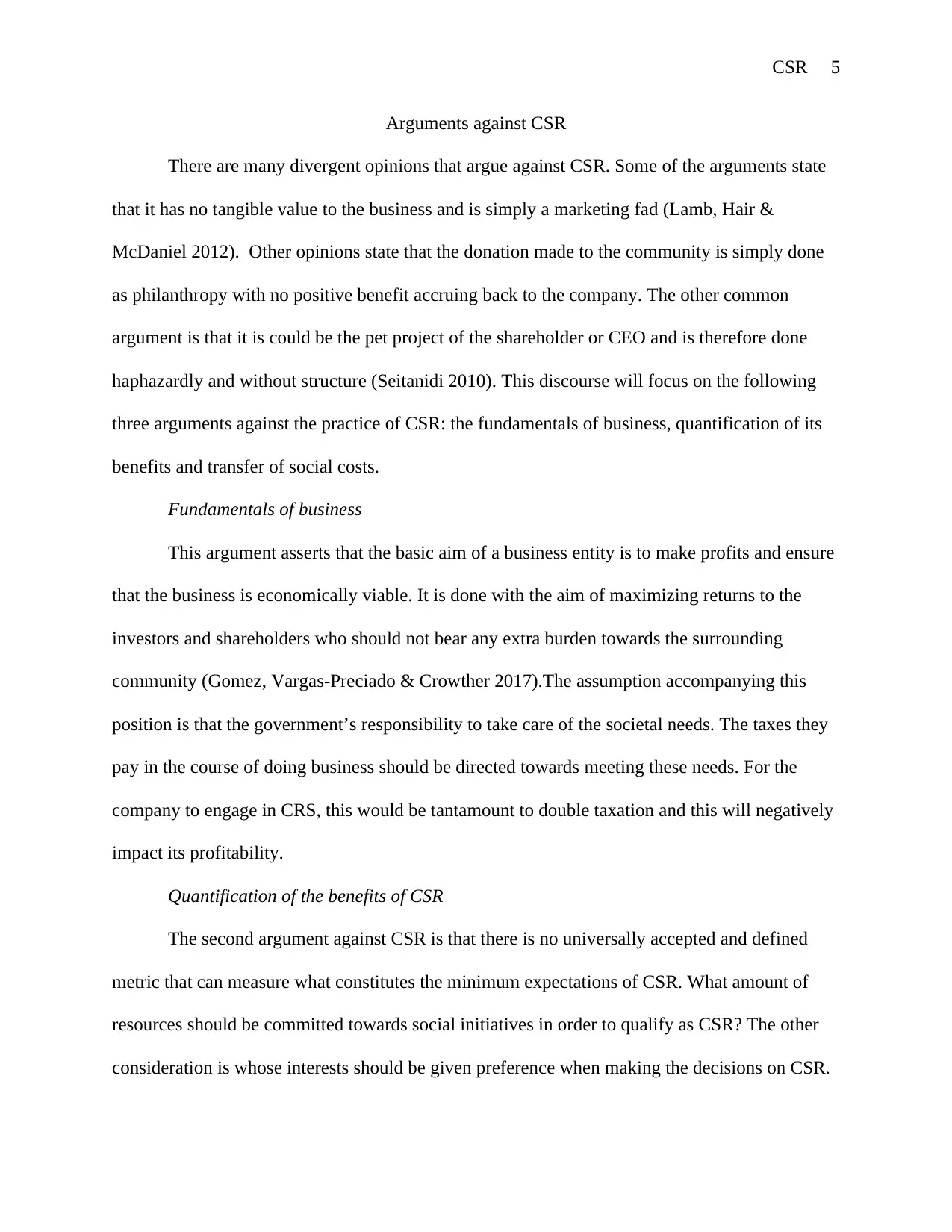
CSR 5
Arguments against CSR
There are many divergent opinions that argue against CSR. Some of the arguments state
that it has no tangible value to the business and is simply a marketing fad (Lamb, Hair &
McDaniel 2012). Other opinions state that the donation made to the community is simply done
as philanthropy with no positive benefit accruing back to the company. The other common
argument is that it is could be the pet project of the shareholder or CEO and is therefore done
haphazardly and without structure (Seitanidi 2010). This discourse will focus on the following
three arguments against the practice of CSR: the fundamentals of business, quantification of its
benefits and transfer of social costs.
Fundamentals of business
This argument asserts that the basic aim of a business entity is to make profits and ensure
that the business is economically viable. It is done with the aim of maximizing returns to the
investors and shareholders who should not bear any extra burden towards the surrounding
community (Gomez, Vargas-Preciado & Crowther 2017).The assumption accompanying this
position is that the government’s responsibility to take care of the societal needs. The taxes they
pay in the course of doing business should be directed towards meeting these needs. For the
company to engage in CRS, this would be tantamount to double taxation and this will negatively
impact its profitability.
Quantification of the benefits of CSR
The second argument against CSR is that there is no universally accepted and defined
metric that can measure what constitutes the minimum expectations of CSR. What amount of
resources should be committed towards social initiatives in order to qualify as CSR? The other
consideration is whose interests should be given preference when making the decisions on CSR.
Arguments against CSR
There are many divergent opinions that argue against CSR. Some of the arguments state
that it has no tangible value to the business and is simply a marketing fad (Lamb, Hair &
McDaniel 2012). Other opinions state that the donation made to the community is simply done
as philanthropy with no positive benefit accruing back to the company. The other common
argument is that it is could be the pet project of the shareholder or CEO and is therefore done
haphazardly and without structure (Seitanidi 2010). This discourse will focus on the following
three arguments against the practice of CSR: the fundamentals of business, quantification of its
benefits and transfer of social costs.
Fundamentals of business
This argument asserts that the basic aim of a business entity is to make profits and ensure
that the business is economically viable. It is done with the aim of maximizing returns to the
investors and shareholders who should not bear any extra burden towards the surrounding
community (Gomez, Vargas-Preciado & Crowther 2017).The assumption accompanying this
position is that the government’s responsibility to take care of the societal needs. The taxes they
pay in the course of doing business should be directed towards meeting these needs. For the
company to engage in CRS, this would be tantamount to double taxation and this will negatively
impact its profitability.
Quantification of the benefits of CSR
The second argument against CSR is that there is no universally accepted and defined
metric that can measure what constitutes the minimum expectations of CSR. What amount of
resources should be committed towards social initiatives in order to qualify as CSR? The other
consideration is whose interests should be given preference when making the decisions on CSR.
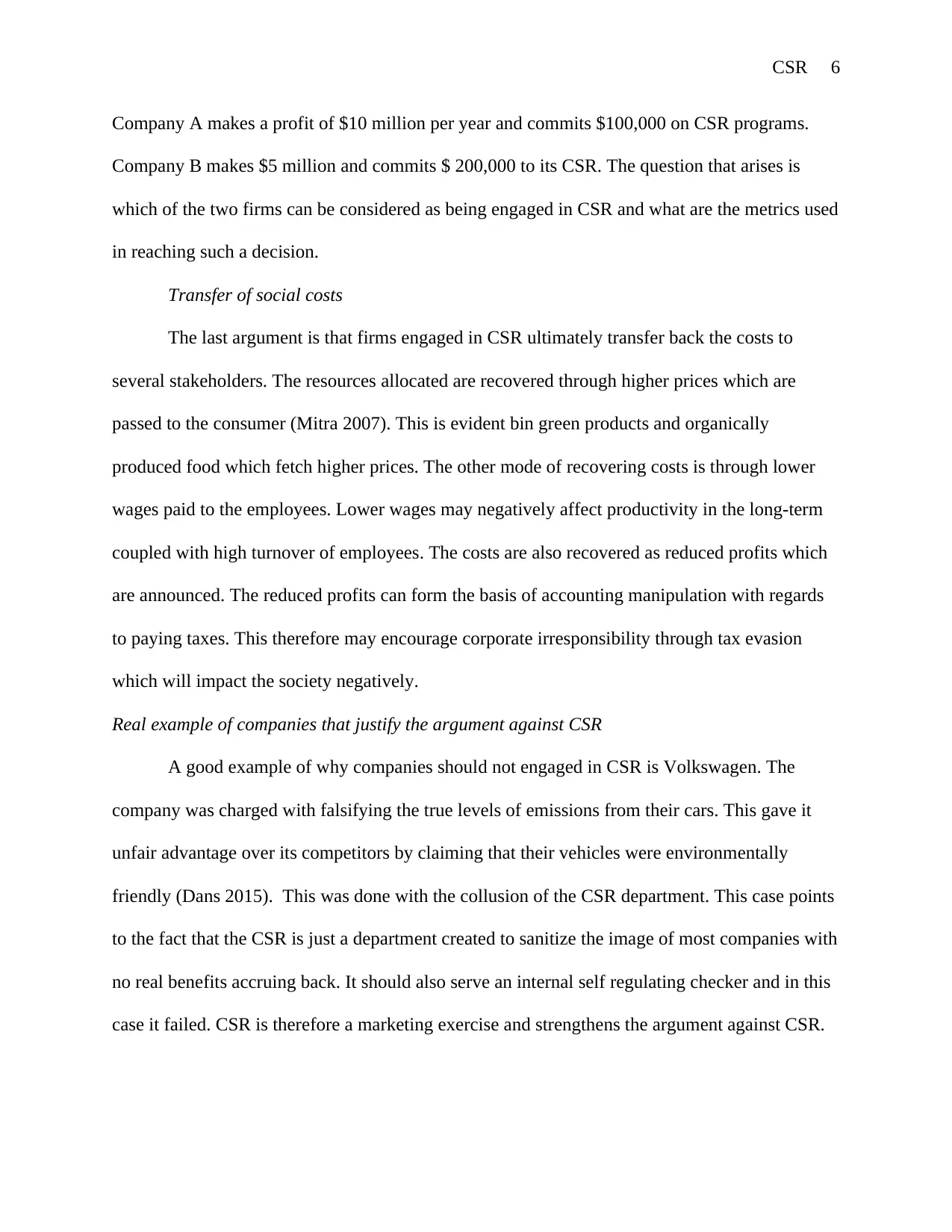
CSR 6
Company A makes a profit of $10 million per year and commits $100,000 on CSR programs.
Company B makes $5 million and commits $ 200,000 to its CSR. The question that arises is
which of the two firms can be considered as being engaged in CSR and what are the metrics used
in reaching such a decision.
Transfer of social costs
The last argument is that firms engaged in CSR ultimately transfer back the costs to
several stakeholders. The resources allocated are recovered through higher prices which are
passed to the consumer (Mitra 2007). This is evident bin green products and organically
produced food which fetch higher prices. The other mode of recovering costs is through lower
wages paid to the employees. Lower wages may negatively affect productivity in the long-term
coupled with high turnover of employees. The costs are also recovered as reduced profits which
are announced. The reduced profits can form the basis of accounting manipulation with regards
to paying taxes. This therefore may encourage corporate irresponsibility through tax evasion
which will impact the society negatively.
Real example of companies that justify the argument against CSR
A good example of why companies should not engaged in CSR is Volkswagen. The
company was charged with falsifying the true levels of emissions from their cars. This gave it
unfair advantage over its competitors by claiming that their vehicles were environmentally
friendly (Dans 2015). This was done with the collusion of the CSR department. This case points
to the fact that the CSR is just a department created to sanitize the image of most companies with
no real benefits accruing back. It should also serve an internal self regulating checker and in this
case it failed. CSR is therefore a marketing exercise and strengthens the argument against CSR.
Company A makes a profit of $10 million per year and commits $100,000 on CSR programs.
Company B makes $5 million and commits $ 200,000 to its CSR. The question that arises is
which of the two firms can be considered as being engaged in CSR and what are the metrics used
in reaching such a decision.
Transfer of social costs
The last argument is that firms engaged in CSR ultimately transfer back the costs to
several stakeholders. The resources allocated are recovered through higher prices which are
passed to the consumer (Mitra 2007). This is evident bin green products and organically
produced food which fetch higher prices. The other mode of recovering costs is through lower
wages paid to the employees. Lower wages may negatively affect productivity in the long-term
coupled with high turnover of employees. The costs are also recovered as reduced profits which
are announced. The reduced profits can form the basis of accounting manipulation with regards
to paying taxes. This therefore may encourage corporate irresponsibility through tax evasion
which will impact the society negatively.
Real example of companies that justify the argument against CSR
A good example of why companies should not engaged in CSR is Volkswagen. The
company was charged with falsifying the true levels of emissions from their cars. This gave it
unfair advantage over its competitors by claiming that their vehicles were environmentally
friendly (Dans 2015). This was done with the collusion of the CSR department. This case points
to the fact that the CSR is just a department created to sanitize the image of most companies with
no real benefits accruing back. It should also serve an internal self regulating checker and in this
case it failed. CSR is therefore a marketing exercise and strengthens the argument against CSR.
⊘ This is a preview!⊘
Do you want full access?
Subscribe today to unlock all pages.

Trusted by 1+ million students worldwide
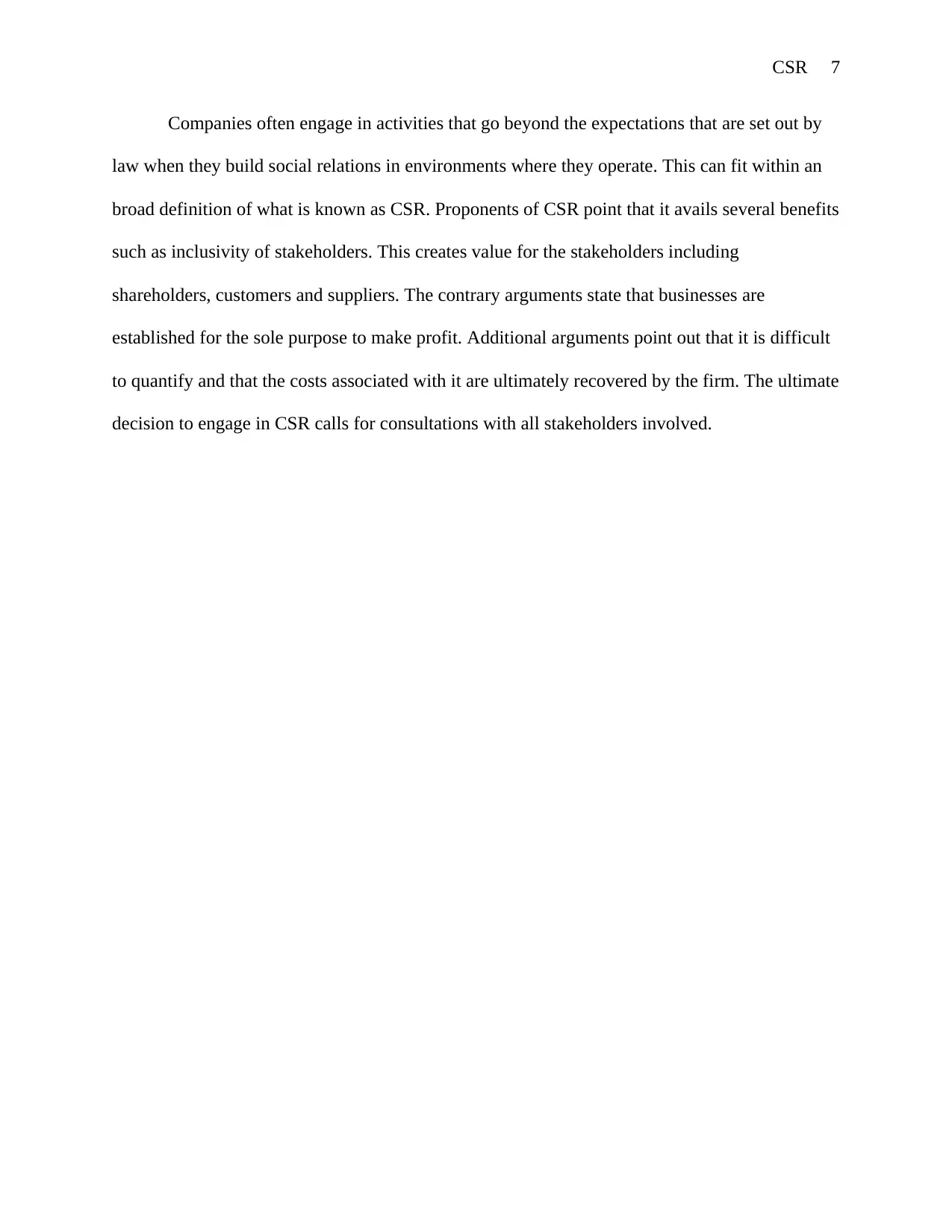
CSR 7
Companies often engage in activities that go beyond the expectations that are set out by
law when they build social relations in environments where they operate. This can fit within an
broad definition of what is known as CSR. Proponents of CSR point that it avails several benefits
such as inclusivity of stakeholders. This creates value for the stakeholders including
shareholders, customers and suppliers. The contrary arguments state that businesses are
established for the sole purpose to make profit. Additional arguments point out that it is difficult
to quantify and that the costs associated with it are ultimately recovered by the firm. The ultimate
decision to engage in CSR calls for consultations with all stakeholders involved.
Companies often engage in activities that go beyond the expectations that are set out by
law when they build social relations in environments where they operate. This can fit within an
broad definition of what is known as CSR. Proponents of CSR point that it avails several benefits
such as inclusivity of stakeholders. This creates value for the stakeholders including
shareholders, customers and suppliers. The contrary arguments state that businesses are
established for the sole purpose to make profit. Additional arguments point out that it is difficult
to quantify and that the costs associated with it are ultimately recovered by the firm. The ultimate
decision to engage in CSR calls for consultations with all stakeholders involved.
Paraphrase This Document
Need a fresh take? Get an instant paraphrase of this document with our AI Paraphraser
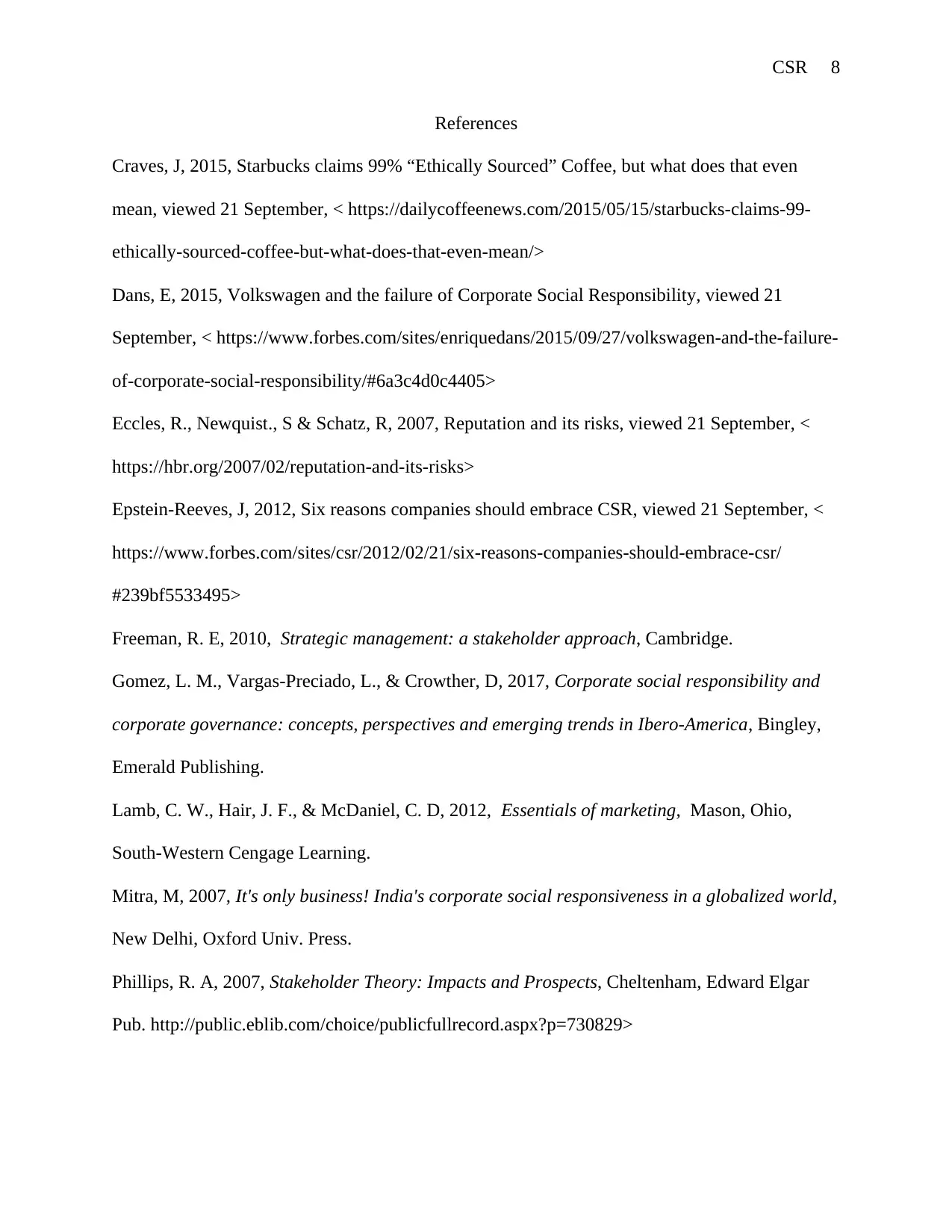
CSR 8
References
Craves, J, 2015, Starbucks claims 99% “Ethically Sourced” Coffee, but what does that even
mean, viewed 21 September, < https://dailycoffeenews.com/2015/05/15/starbucks-claims-99-
ethically-sourced-coffee-but-what-does-that-even-mean/>
Dans, E, 2015, Volkswagen and the failure of Corporate Social Responsibility, viewed 21
September, < https://www.forbes.com/sites/enriquedans/2015/09/27/volkswagen-and-the-failure-
of-corporate-social-responsibility/#6a3c4d0c4405>
Eccles, R., Newquist., S & Schatz, R, 2007, Reputation and its risks, viewed 21 September, <
https://hbr.org/2007/02/reputation-and-its-risks>
Epstein-Reeves, J, 2012, Six reasons companies should embrace CSR, viewed 21 September, <
https://www.forbes.com/sites/csr/2012/02/21/six-reasons-companies-should-embrace-csr/
#239bf5533495>
Freeman, R. E, 2010, Strategic management: a stakeholder approach, Cambridge.
Gomez, L. M., Vargas-Preciado, L., & Crowther, D, 2017, Corporate social responsibility and
corporate governance: concepts, perspectives and emerging trends in Ibero-America, Bingley,
Emerald Publishing.
Lamb, C. W., Hair, J. F., & McDaniel, C. D, 2012, Essentials of marketing, Mason, Ohio,
South-Western Cengage Learning.
Mitra, M, 2007, It's only business! India's corporate social responsiveness in a globalized world,
New Delhi, Oxford Univ. Press.
Phillips, R. A, 2007, Stakeholder Theory: Impacts and Prospects, Cheltenham, Edward Elgar
Pub. http://public.eblib.com/choice/publicfullrecord.aspx?p=730829>
References
Craves, J, 2015, Starbucks claims 99% “Ethically Sourced” Coffee, but what does that even
mean, viewed 21 September, < https://dailycoffeenews.com/2015/05/15/starbucks-claims-99-
ethically-sourced-coffee-but-what-does-that-even-mean/>
Dans, E, 2015, Volkswagen and the failure of Corporate Social Responsibility, viewed 21
September, < https://www.forbes.com/sites/enriquedans/2015/09/27/volkswagen-and-the-failure-
of-corporate-social-responsibility/#6a3c4d0c4405>
Eccles, R., Newquist., S & Schatz, R, 2007, Reputation and its risks, viewed 21 September, <
https://hbr.org/2007/02/reputation-and-its-risks>
Epstein-Reeves, J, 2012, Six reasons companies should embrace CSR, viewed 21 September, <
https://www.forbes.com/sites/csr/2012/02/21/six-reasons-companies-should-embrace-csr/
#239bf5533495>
Freeman, R. E, 2010, Strategic management: a stakeholder approach, Cambridge.
Gomez, L. M., Vargas-Preciado, L., & Crowther, D, 2017, Corporate social responsibility and
corporate governance: concepts, perspectives and emerging trends in Ibero-America, Bingley,
Emerald Publishing.
Lamb, C. W., Hair, J. F., & McDaniel, C. D, 2012, Essentials of marketing, Mason, Ohio,
South-Western Cengage Learning.
Mitra, M, 2007, It's only business! India's corporate social responsiveness in a globalized world,
New Delhi, Oxford Univ. Press.
Phillips, R. A, 2007, Stakeholder Theory: Impacts and Prospects, Cheltenham, Edward Elgar
Pub. http://public.eblib.com/choice/publicfullrecord.aspx?p=730829>
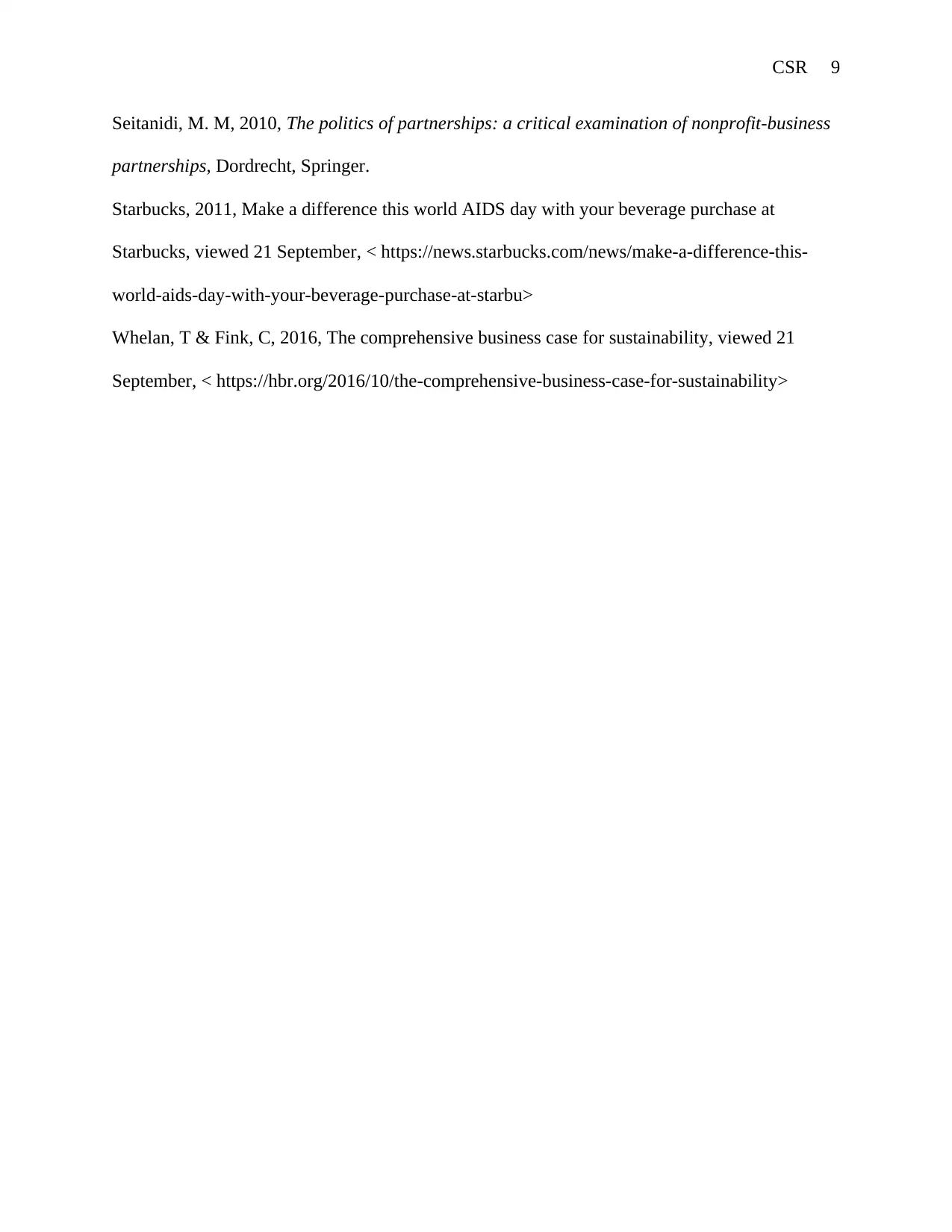
CSR 9
Seitanidi, M. M, 2010, The politics of partnerships: a critical examination of nonprofit-business
partnerships, Dordrecht, Springer.
Starbucks, 2011, Make a difference this world AIDS day with your beverage purchase at
Starbucks, viewed 21 September, < https://news.starbucks.com/news/make-a-difference-this-
world-aids-day-with-your-beverage-purchase-at-starbu>
Whelan, T & Fink, C, 2016, The comprehensive business case for sustainability, viewed 21
September, < https://hbr.org/2016/10/the-comprehensive-business-case-for-sustainability>
Seitanidi, M. M, 2010, The politics of partnerships: a critical examination of nonprofit-business
partnerships, Dordrecht, Springer.
Starbucks, 2011, Make a difference this world AIDS day with your beverage purchase at
Starbucks, viewed 21 September, < https://news.starbucks.com/news/make-a-difference-this-
world-aids-day-with-your-beverage-purchase-at-starbu>
Whelan, T & Fink, C, 2016, The comprehensive business case for sustainability, viewed 21
September, < https://hbr.org/2016/10/the-comprehensive-business-case-for-sustainability>
⊘ This is a preview!⊘
Do you want full access?
Subscribe today to unlock all pages.

Trusted by 1+ million students worldwide
1 out of 9
Related Documents
Your All-in-One AI-Powered Toolkit for Academic Success.
+13062052269
info@desklib.com
Available 24*7 on WhatsApp / Email
![[object Object]](/_next/static/media/star-bottom.7253800d.svg)
Unlock your academic potential
Copyright © 2020–2025 A2Z Services. All Rights Reserved. Developed and managed by ZUCOL.





